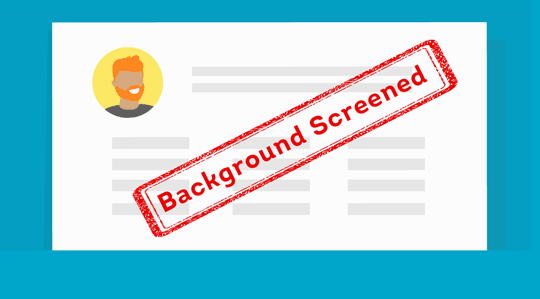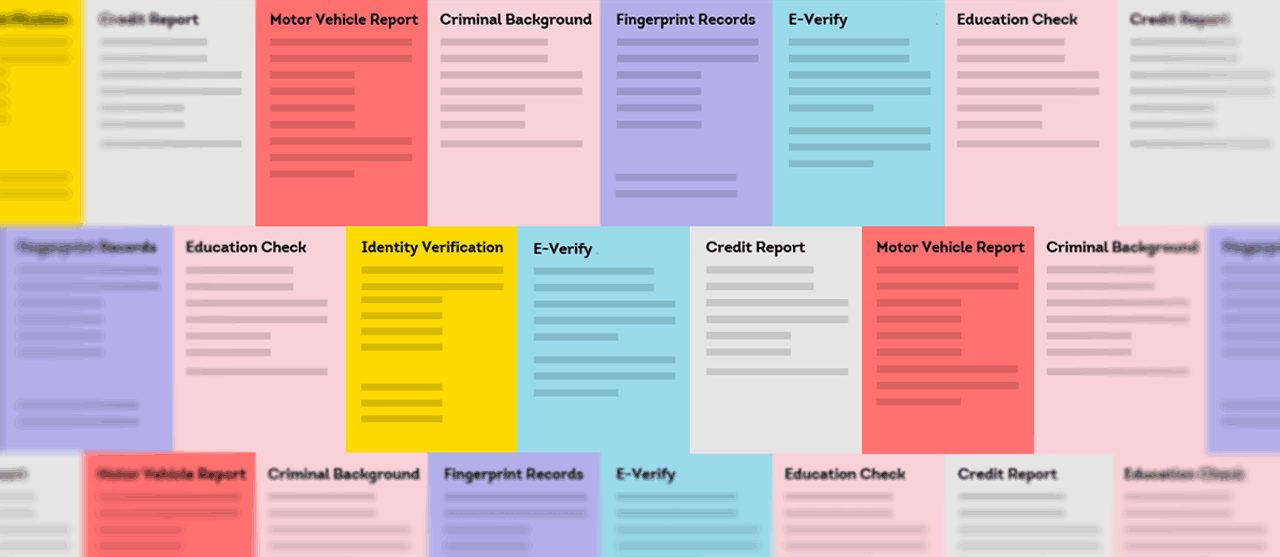Running pre-employment background checks is an essential responsibility to help protect your small business against destructive hires. However, not all background checks are created equally. Different types of background checks have different time periods that determine how far back a report can go. These “lookback” periods vary widely and are largely determined by state law. This article covers what you need to know about lookback periods for different kinds of screening when hiring new employees.
Table of Contents:
What is a Background Check?
How are Background Checks Used?
How Far Back do Background Checks Go?
Criminal Background Checks
Credit and Financial Reports
Educational Credential Verification
Employment History
Simplify Employee Background Checks with ShareAble For Hires
Remember that this material is intended to provide you with helpful information and is not to be relied upon to make decisions, nor is this material intended to be or construed as legal advice. You are encouraged to consult your legal counsel for advice on your specific business operations and responsibilities under applicable law. Trademarks used in this material are the property of their respective owners and no affiliation or endorsement is implied.
Introduction
The last thing you want in your home is someone tracking muddy boots on your freshly cleaned white carpet. Similarly, the last thing you want in your small business is someone with a murky past that could harm your livelihood.
According to a 2021 ResumeBuilder survey, 1 in 3 Americans admitted to lying on a resume in hopes of landing a job. If someone is willing to hide their past and lie on the application, there’s no telling what they might do if you let them loose in your small business.
A bad hire can cost small businesses thousands––and even tens of thousands––of dollars. It’s essential to learn everything you can about a candidate before signing any papers with thorough pre-employment screening through a service like ShareAble for Hires.
That said, many small business owners are unfamiliar with the various federal and local laws that dictate how far back a background check can go. To help you stay squeaky clean, this article covers basic information about the length of time employers and background check firms can “look back” into a job applicant’s past.
One important note is that background check regulations vary from state to state. Although this article provides a summary overview, it’s essential to research lookback periods in your particular area–and potentially contact your legal counsel–before trying to run any screening on your own.
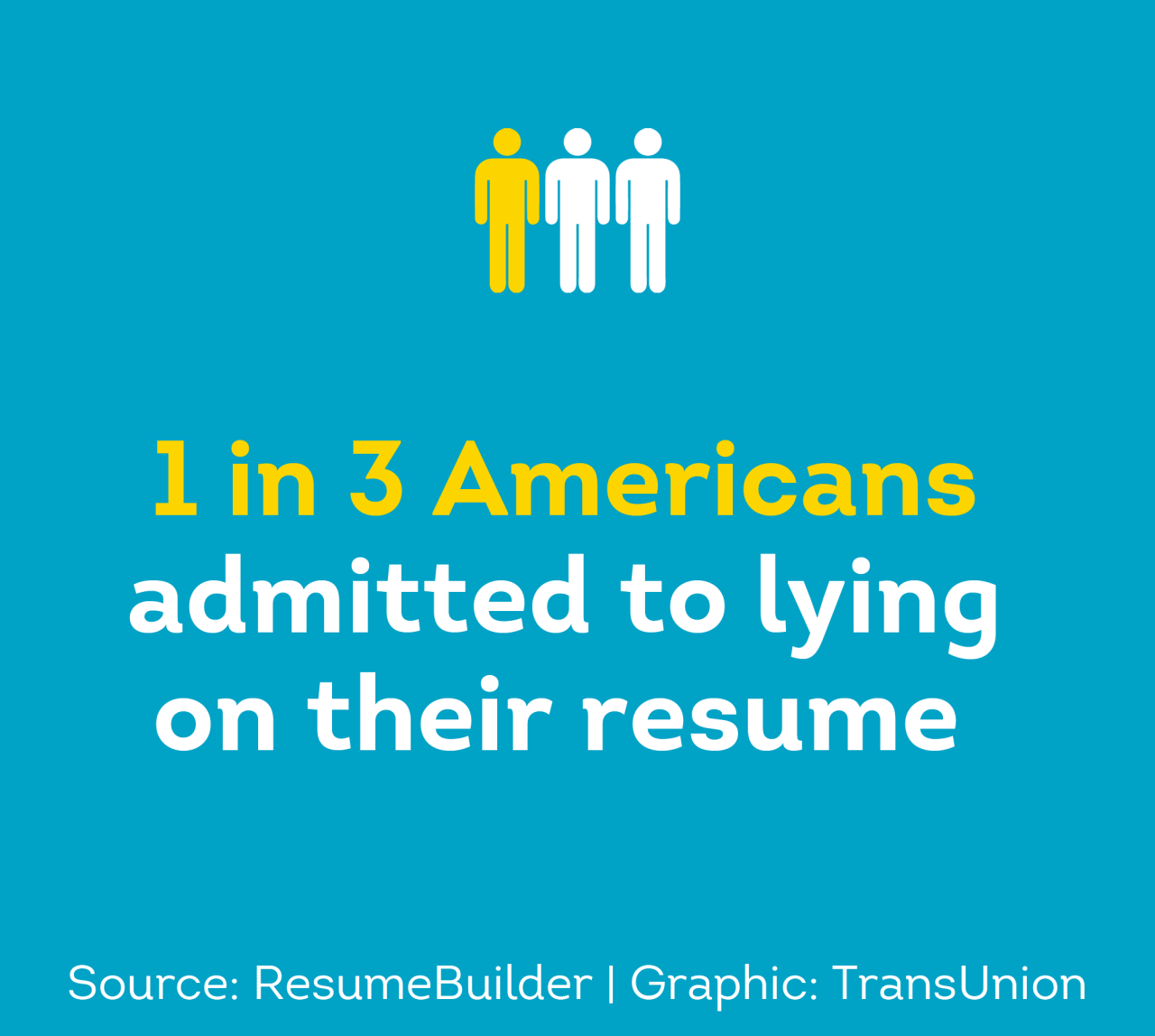
What is a Background Check?
Before going into the lookback period for various pre-employment screening, it’s helpful to first determine what running a “background check” really means. Rather than a single report, the term “background check” could be applied to a variety of records and document verifications.
Examples of information contained in various background reports include:
- Criminal history
- Credit score
- Financial and borrowing history
- Identity verification
- Educational credential checks
- Employment history
- Employer reference checks
- Eviction record
- Past addresses
- Housing, education, and/or employment history
Most professional background check providers combine multiple record types into a single report. For example, a complete screening package from ShareAble for Hires includes a criminal record report, a credit check, and identity verification through several federal databases, including SSN verification and fraud alerts.
Each piece of information included in any background check potentially has several different federal and local laws that govern what and how much information can be made available to employers.
How are Background Checks Used?
Background checks are primarily used by financial institutions, lenders, employers, and landlords to help these entities learn more about applicants. Having more information helps decision-makers make more confident judgements.
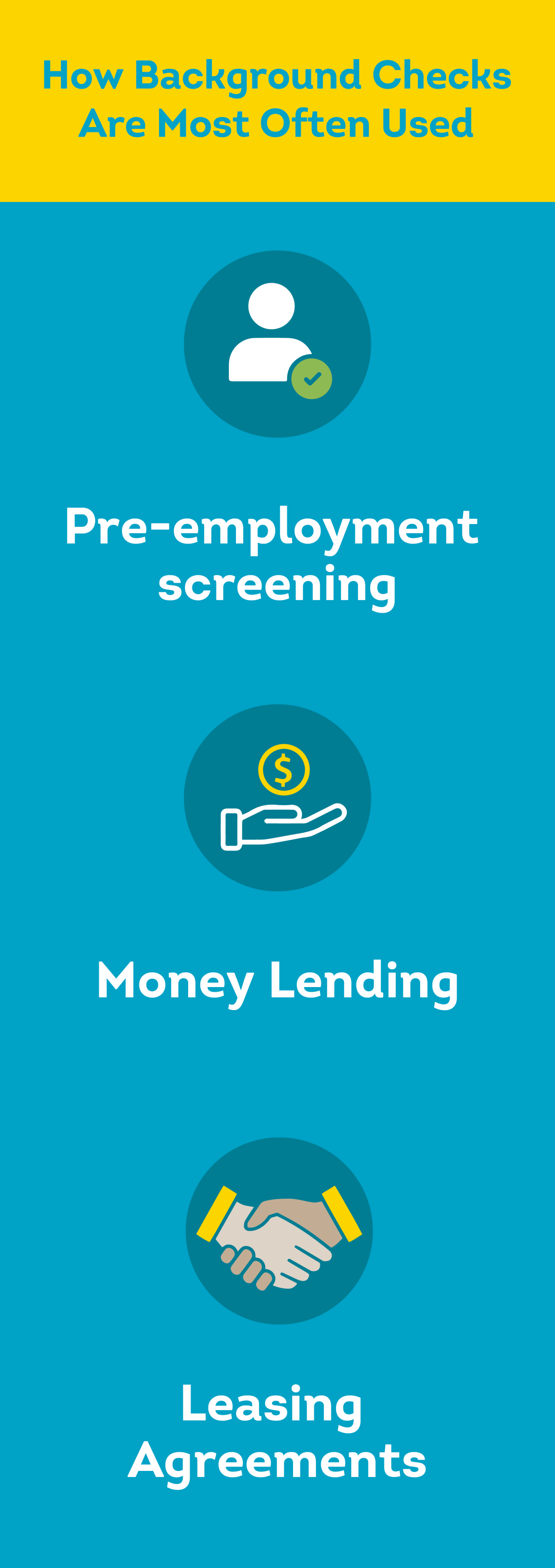
Here are three examples of how background checks are used:
Pre-employment screening. Most employers use a variety of employment background checks to learn more about job candidates. If a job applicant has a relevant criminal past or a reckless financial history, they could be a potential threat to the safety and success of a business––especially a small business.
Money lending. Housing, car, and other loan providers may run background checks, especially credit checks. These help gauge an applicant’s creditworthiness and history with finances. If someone has a shaky history with money, there may be a greater risk of non-payment.
Leasing apartments. Landlords may run criminal reports, eviction checks, and other background screenings to help confirm a tenant’s rental record is acceptable. It’s helpful for landlords to know if someone has a history of not paying rent or destroying previous rentals before making a leasing decision.
How Far Back do Background Checks Go?
Like many hiring-related items, there are several intersecting federal, state, and local laws that determine how far back in the past background checks extend. Additionally, the length of time background checks go back often depends on the type of report, where the job applicant and employer are located, and even the type of job someone is applying for.
At the very basic level, most criminal and financial background reports include only items that occurred in the last seven years. However, when it comes to employment screening, many decisions are made at the state level. These rules can vary drastically by circumstance, state, and the specific report in question.
Because the lookback period varies, some small business owners can get themselves into trouble when trying to run a DIY background check. Instead of attempting to figure it out on your own and risking legal trouble, it’s better to use a well-established professional employment screening service that’s FCRA-compliant and follows all the rules, such as ShareAble for Hires.
Below are examples of some of the restrictions around various report types. These examples are provided for general reference only and should not be considered legal advice. If you have any questions, contact your legal counsel
Criminal Background Checks
As an employer, it’s your duty to keep your existing staff, business, neighbors, and livelihood safe. Part of that responsibility is learning if someone you want to hire has relevant criminal history that could put your business at risk.
Though you might want to know everything that’s ever happened in someone’s life, many U.S. states only allow items to be included on general criminal reports if they occurred in the last seven years.
Four Different States, Four Different Rules:
- Thyberg Law states that the state of California limits employer background checks to the past seven years. However, according to legal resource NOLO, some crimes, such as non-felony marijuana convictions in California can only be reported for two years.
- In the state of Missouri, Nolo also claims the state has “no law that specifically restricts employer use of criminal records.”
- In New York, Fair Chance laws 1) limit the lookback period of reporting agencies to seven years, and 2) restrict criminal record disclosures to the final stages of hiring. However, jobs in the financial services sector are exempt from these rules.
- According to Kielich Law Firm, criminal background checks in Texas are limited to a seven-year lookback period––except when the position’s salary exceeds $75,000. In that case, an employer can look back to a job applicant’s 18th birthday.
As you can see, these laws vary widely according to state, offense, circumstance, and even the position. As these rules can get complicated, it’s best to use a reputable employment background check provider that manages these intricacies for you.
ShareAble for Hires criminal record reports scan 370+ million federal and state-level arrest records to deliver more trustworthy, FCRA-compliant reports compiled from dozens of agencies. You can feel more confident that your results are reliable and legally obtained, so that you can make more informed hiring decisions.
Credit and Financial Reports
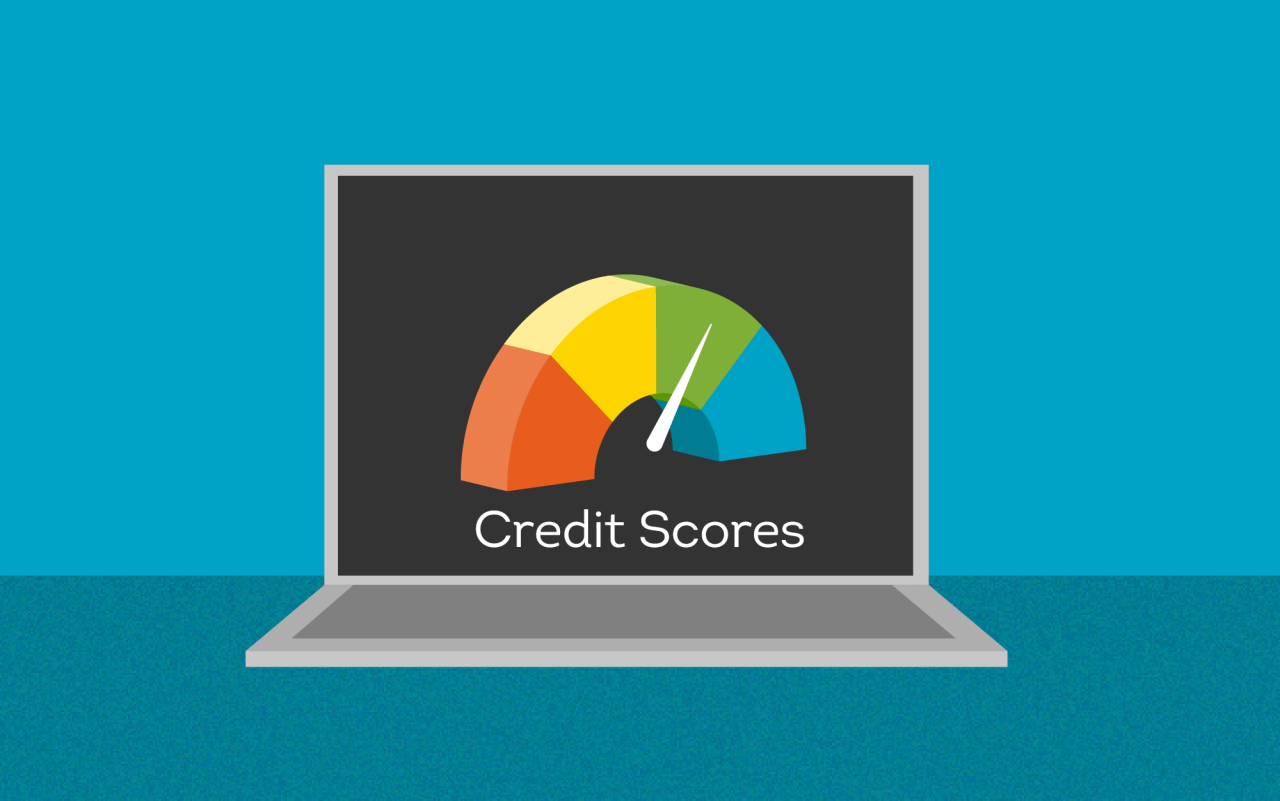
Revealing a job candidate’s financial past through a pre-employment credit report can be just as important as checking out their criminal record. This is especially true if your applicant will handle money or sensitive data.
What shows up on credit and financial reports?
There are a lot of different items that might show up on someone’s credit or financial background report. Examples of items that show up on credit reports might include:
- Personal information, such as name and SSN
- Companies that have extended credit or loans to someone
- Credit limits
- Loan amounts
- Payment history
- Credit inquiries
- Public records
- Bankruptcies
- Unpaid debt
- Accounts sent to collections
As a potential employer, it’s essential to know how to read a job applicant’s credit report. Knowing what’s important, what’s acceptable, and any potential red flags can help you make better hiring decisions.
How long do items stay on someone’s credit report?
In general, items stay on credit reports from 2-10 years. However, like with criminal records, the exact length of time depends on the type of information, as well as federal and state laws.
The Fair Credit Reporting Act (FCRA) is a federal law that dictates how consumer data can be used and shared. When it comes to credit checks for employment, the FCRA limits “lookback” periods for most kinds of consumer information to seven years. Again, the time period can vary.
Examples:
- The FCRA regulations might mean incidents like foreclosures and forcible detainers may show up for only seven years.
- However, according to big-three credit agency TransUnion, some items like bankruptcies could show up on a report for up to 10 years
Additionally, like with criminal records, the “lookback” period may be extended by state or federal law for financial jobs or those with higher salaries.
Even though these laws vary, there’s no reason to stress. Using a service like ShareAble for Hires for employment credit checks takes care of the lookback window and FCRA-requirements for you, so that you can focus on your candidates.
Educational Credential Verification

As mentioned in the introduction, one-third of Americans admit to lying on resumes. The same ResumeBuilder survey mentioned that educational background is the second-most common lie on a resume. How would you feel if someone you hired fibbed about the fancy degrees and certifications they claimed to have earned?
When hiring new employees it is so important to know how to verify an applicant's educational history to confirm they actually have the degrees and skills they say they do. If not, you could be found liable in a negligent hiring lawsuit if a new hire’s incompetence leads to injury or property damage.
Thankfully, because education and certification can stretch across a person’s life, there is really no limit for the amount of time you can look into an employee’s educational history. Perhaps it’s not important to dig up someone’s kindergarten report card. However, if you require certain educational standards or certifications for your open position, it’s essential to independently confirm the credentials exist.
Employment History

Like with educational credentials, there is really no limit on how far back you can verify job applicant employment history. Like education and earned certifications, job applicants frequently lie about work experience on resumes.
The most common falsehoods involve fake titles, inflated time periods of working for a certain employer, and misleading or padded responsibilities. In addition to knowing what reference check questions to ask previous employers, it’s helpful to look through application materials with a keen eye to catch potential fraudsters in their tracks.
Simplify Employee Background Checks with ShareAble for Hires
Background check laws are murky. Between drastically different state laws, complex lookback periods for different positions, and muddled reporting requirements, it’s easy for small business owners to get sucked into a legal mess during the hiring process. Why not keep it simple? Streamline pre-employment background checks with thorough pre-employment screening through ShareAble for Hires.
Created specifically for independent landlords with only occasional screening needs, ShareAble for Hires takes care of all job applicant consent, lookback periods, and regulatory compliance requirements for you. Without the stress of figuring out how far you can look back into the past, you can focus on what’s important: the candidate’s fit for your job.
With extra-fast online screening, you can get same-day results in one easy-to-read report––all while knowing your screening is legal and reliable. Does your job applicant have a worrying past? Criminal background reports check dozens of law enforcement agencies and 370+ million criminal records to see if your candidate’s information matches.
Learn if your top choice’s financial track record might mean trouble for your business. Backed by trustworthy data from TransUnion, FCRA-compliant credit reports deep dive into your job applicant’s history, so you can get the information you need.
Don’t get trapped in the muddy waters of employee background screening. Keep hiring neat, tidy, and easy with ultra-fast, compliant background checks through ShareAble for Hires.


